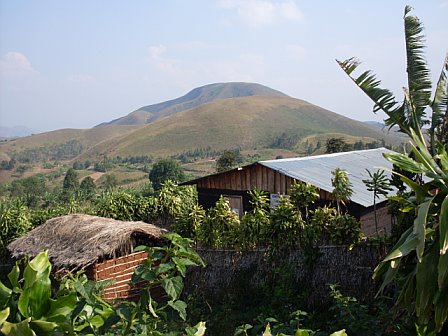 Last week we were able to get Sarah Bristol, Traditional 2012 student and Provost’s Undergraduate Research Award (PURA) award winner started on her very innovative photo-based research project, “Mothers’ Documentation of the Persistent Impact of War on Their Children and Family in the Democratic Republic of Congo.” Sarah is working in partnership with our colleagues at Foundation RamaLevina (FORAL), a program that provides free mobile health care, psychosocial support, socio-economic support and reintegration to families and communities in 5 rural villages. This Congolese led foundation is engaged in a multitude of innovative projects with women survivors of rape and their families. After meeting with the FORAL team and discussing the projects objectives and methods we still need to work out all the logistics of transporting digital cameras to the village, storing the cameras, charging the cameras and downloading photos to discuss with the participants. For example, there was concern expressed by colleagues at FORAL that if the camera stayed at the village home of a participant for more than a few days at a time, a family member may be tempted to sell the camera for much needed resources and it may be difficult for the participant to prevent this given the multiple demands of a large family. The women and team discussed this challenge and decided the cameras would be stored with the village chief’s wife and the participants would stop by each morning to pick of the camera for the days use. The chief’s wife felt she could safely secure the cameras.
Last week we were able to get Sarah Bristol, Traditional 2012 student and Provost’s Undergraduate Research Award (PURA) award winner started on her very innovative photo-based research project, “Mothers’ Documentation of the Persistent Impact of War on Their Children and Family in the Democratic Republic of Congo.” Sarah is working in partnership with our colleagues at Foundation RamaLevina (FORAL), a program that provides free mobile health care, psychosocial support, socio-economic support and reintegration to families and communities in 5 rural villages. This Congolese led foundation is engaged in a multitude of innovative projects with women survivors of rape and their families. After meeting with the FORAL team and discussing the projects objectives and methods we still need to work out all the logistics of transporting digital cameras to the village, storing the cameras, charging the cameras and downloading photos to discuss with the participants. For example, there was concern expressed by colleagues at FORAL that if the camera stayed at the village home of a participant for more than a few days at a time, a family member may be tempted to sell the camera for much needed resources and it may be difficult for the participant to prevent this given the multiple demands of a large family. The women and team discussed this challenge and decided the cameras would be stored with the village chief’s wife and the participants would stop by each morning to pick of the camera for the days use. The chief’s wife felt she could safely secure the cameras.
I was so pleased to observe the implementation of the project. Last Tuesday Sarah met six women from a village participating in FORAL’s solidarity group for women survivors of violence. Sarah and the women sat under a tree in the village near their field where they work. She began to teach these women who had never touched a camera or seen a picture of themselves to use one. It was one of the most amazing experiences I have had. The women started out afraid to touch the camera or push the buttons too hard to take the picture. They initially had trouble holding the digital camera and lining up their picture – but within a 30-minute period, a transformation happened. The women started learning how to take a picture and then see the picture they took. They laughed and smiled with joy at their pictures. They listened to Sarah as she coached them through the taking of a picture, viewing the picture and then taking another picture. They each had a camera and learned how to turn the camera on and off – to save the battery life as well as delete a picture they did not want. After about 90 minutes of training and practicing, Sarah gave the 6 women their first assignment. She asked them to take 5 pictures of something that was beautiful to them and represented their lives. The women quickly got up and ran off in different directions with their cameras to complete their assignment. Thirty minutes later the women rejoined Sarah in the place under the tree. They each choose 2 pictures to discuss. Sarah asked each of them to tell her why they choose the pictures to discuss and why they took the picture. One woman presented a picture of a man and woman walking up a hill carrying heavy loads. She stated she took the picture as it reminds her of the times the villagers loaded all their belongings on their backs and heads to flee the violence of the war. Then she picked up another picture, this one was of a goat. She said the goat represented the progress they were making in rebuilding their lives in the villages after the war. At that moment, the whole team understood that the 6 women were going to take amazing pictures and tell powerful stories through their photos. We hope the project will help document their strength and survival in rural DRC.
